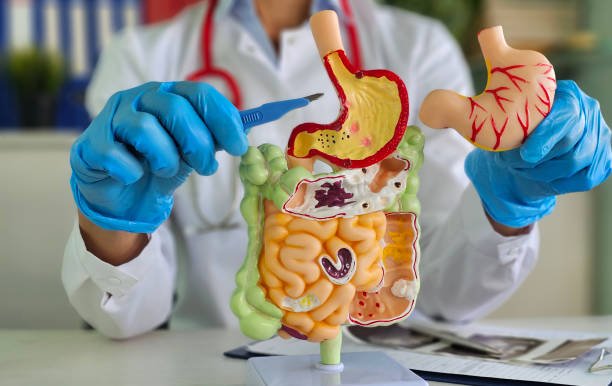We envision a world where everyone has the tools and knowledge to live a balanced, healthy, and fulfilling life. By providing reliable resources, personalized programs, and community support, we aim to be a beacon of hope for those on their health journey.
Table of Contents
Introduction to Gut Health Detox Your Gut
Gut health serves as a vital component of overall well-being and has been a focal point of research in recent years. The gut, often referred to as the digestive system, encompasses a complex system of organs including the stomach and intestines, which function collectively to digest food, absorb nutrients, and eliminate waste. However, gut health extends beyond the mere processing of food; it is intricately linked to various aspects of physical and mental health through the gut microbiome.
The gut microbiome consists of trillions of microorganisms, including bacteria, viruses, and fungi, that reside in the gastrointestinal tract. These microbes play a crucial role in digestion by helping to break down complex carbohydrates and synthesize certain vitamins. Furthermore, the gut microbiome is instrumental in maintaining immune function, as it helps to protect against pathogenic bacteria and viruses. This intricate balance of microbes is essential; any disturbance may lead to gastrointestinal disorders such as irritable bowel syndrome or inflammatory bowel disease.
Moreover, research has uncovered a compelling connection between gut health and mental well-being. The gut-brain axis reflects the bidirectional communication between the gut and the brain, where gut health may influence mood, cognitive function, and even the risk of mental health disorders such as depression and anxiety. This growing body of evidence highlights the importance of understanding how maintaining a healthy gut can significantly impact overall health and wellness.
As we delve deeper into the various facets of gut health throughout this guide, we will examine practical steps for improving gut microbiome diversity and discuss dietary and lifestyle choices that can enhance digestive health. Additionally, authoritative sources will be linked to provide readers with further insights and evidence-based research on gut health.
The Digestive System: An Overview
The digestive system is a complex network of organs and structures that work in concert to process food, absorb nutrients, and eliminate waste. This intricate system begins in the mouth, where the process of digestion is initiated through mechanical and chemical means. Chewing, or mastication, breaks down food into smaller pieces, while saliva contains enzymes that begin the chemical breakdown of carbohydrates. The food then travels down the esophagus to the stomach.
The stomach serves as a muscular sac that further digests food through churning and by mixing it with gastric juices. These juices, rich in hydrochloric acid and digestive enzymes, play a critical role in breaking down proteins and making nutrients accessible for absorption. Once partially digested, the food moves into the small intestine, where the majority of nutrient absorption occurs. The small intestine is divided into three segments: the duodenum, jejunum, and ileum, each contributing to the digestion and absorption of carbohydrates, proteins, and fats.
The liver and pancreas are essential accessory organs that aid in the digestive process. The liver produces bile, which emulsifies fats, making them easier to digest. The pancreas secretes digestive enzymes and bicarbonate to neutralize stomach acid, ensuring an optimal environment for enzymatic reactions in the small intestine. After the small intestine, any undigested food and waste products pass into the large intestine, where water is reabsorbed, and the remaining waste is prepared for elimination through the rectum.
Maintaining a healthy digestive system is vital for overall gut health. Irregularities, such as imbalances in gut flora or digestive disorders, can disrupt this intricate process, leading to various health issues. Understanding the roles of each part of the digestive system is fundamental for recognizing how to support gut health through lifestyle choices, diet, and, when necessary, medical interventions.
Common Digestive Disorders
Digestive disorders encompass a range of conditions affecting the gastrointestinal tract, which can significantly impair daily functioning and overall health. Among the most prevalent disorders are Irritable Bowel Syndrome (IBS), bloating, and gastroesophageal reflux disease (GERD). Each disorder manifests its own set of symptoms and requires tailored management strategies.
Irritable Bowel Syndrome (IBS) is a chronic condition that affects the large intestine. Symptoms typically include abdominal pain, bloating, gas, diarrhea, and constipation. The exact cause of IBS remains unclear, but factors such as genetics, gut microbiota, and psychological stress may contribute to its development. Management often involves dietary changes, such as increasing fiber intake or following a low FODMAP diet, alongside medications aimed at relieving specific symptoms. For further reading on dietary strategies, websites like the Institute for Functional Medicine provide comprehensive resources.
Bloating is another common digestive complaint characterized by an uncomfortable feeling of fullness or swelling in the abdomen. Common causes include overeating, food intolerances, and gastrointestinal disorders. To alleviate bloating, individuals are encouraged to eat smaller meals, avoid carbonated beverages, and possibly incorporate probiotics into their routine. The National Institutes of Health offers valuable research insights into effective management techniques for bloating and similar symptoms.
Gastroesophageal Reflux Disease (GERD) is characterized by persistent heartburn and acid regurgitation due to stomach acid flowing back into the esophagus. This condition can lead to more serious complications if left untreated. Lifestyle modifications, such as weight management, avoiding trigger foods, and sleeping in an elevated position, are often effective initial strategies. In some cases, over-the-counter or prescription medications may also be necessary. Resources from the Mayo Clinic outline current treatments and coping mechanisms for those dealing with GERD.
Overall, understanding these common digestive disorders is essential for effective management and improved well-being. Taking proactive steps to identify symptoms and explore available treatment options can lead to better digestive health.
The Role of Diet in Gut Health
Diet plays a crucial role in maintaining gut health, significantly influencing the stability and diversity of the gut microbiome. A balanced diet that prioritizes whole foods can foster a thriving bacterial community, while unhealthy dietary choices may lead to imbalances that can jeopardize overall well-being. One of the most critical components of a gut-friendly diet is dietary fiber. Foods rich in fiber, such as fruits, vegetables, whole grains, and legumes, serve as nourishment for beneficial gut bacteria, promoting their growth and activity. High-fiber diets have been associated with improved digestion and a reduced risk of digestive disorders.
Equally important are probiotics and prebiotics. Probiotics are live microorganisms found in fermented foods like yogurt, kefir, sauerkraut, and kimchi. Incorporating these foods into one’s diet can enhance the population of beneficial bacteria in the gut. On the other hand, prebiotics, which are non-digestible fibers found in foods such as garlic, onions, and bananas, act as fuel for these probiotics. Together, they form a symbiotic relationship that enhances gut health and supports the immune system.
Conversely, highly processed foods, which are often high in sugars, unhealthy fats, and artificial additives, can have detrimental effects on gut microbiota. These products can promote the growth of harmful bacteria, leading to dysbiosis, which is an imbalance between beneficial and harmful microorganisms. Reducing the intake of processed foods and replacing them with whole, nutrient-dense options is essential for preserving gut health.
To further enrich gut health through diet, individuals might consider meal plans that include a variety of colorful, fiber-rich foods and regular servings of fermented products. Exploring diverse recipes that incorporate these elements can be highly beneficial. For guidance on balanced meal ideas and additional dietary resources, you may consult nutrition experts and related articles on healthy cooking techniques.
The Importance of Hydration
Staying adequately hydrated is vital for maintaining optimal digestive health. Water plays a crucial role in several digestive processes, facilitating the breakdown and absorption of nutrients. During digestion, foods are broken down into smaller components that nutrients can be absorbed into the bloodstream. Adequate fluid intake ensures that these processes occur smoothly, as water helps to dissolve nutrients, making it easier for the intestines to absorb them. Additionally, hydration supports the formation of digestive juices, including saliva and gastric acid, which are essential for the digestion of food.
Another significant benefit of proper hydration is its prevention of constipation. When the body is dehydrated, the colon absorbs more water from waste materials, leading to harder stools that are more difficult to pass. This can result in discomfort and lead to digestive disorders. Conversely, consuming sufficient amounts of water helps keep the stool soft, supporting regular bowel movements. Thus, to promote gut health and prevent digestive issues, it is important to consume the recommended daily intake of water, which can vary depending on individual needs, activity levels, and climate.
To maintain proper hydration, consider carrying a reusable water bottle throughout the day to encourage frequent drinking. It can be beneficial to set reminders or track your water intake using mobile apps or journals. Additionally, incorporating hydrating foods such as fruits and vegetables—like cucumbers, watermelon, and oranges—can enhance overall fluid intake.
Research indicates that even mild dehydration can hinder digestion and nutrient absorption, underlining the importance of making hydration a priority. Overall, understanding the role of hydration in digestive health can lead to improved well-being. For more extensive and detailed guidance on hydration practices, one can refer to credible external sources and hydration guides that elaborate on best practices and offer tailored advice.
Gut Health and Mental Well-being
The relationship between gut health and mental well-being has garnered significant attention in recent years, leading to an emerging field known as psychobiotics. This area of research investigates how the gut microbiome—the complex community of microorganisms residing in the digestive tract—can influence mood, stress levels, and cognitive function. The gut-brain axis, a bi-directional communication system linking the gastrointestinal tract and the brain, plays a pivotal role in this interplay. Through this axis, signals from the gut can affect brain activity and vice versa, indicating that maintaining a healthy gut is crucial for overall mental health.
Numerous studies have indicated that imbalances in gut microbiota composition can lead to psychological issues such as anxiety and depression. For instance, certain probiotics have shown promise in alleviating symptoms of these conditions, suggesting that a healthier gut may contribute to improved mental clarity and emotional stability. Furthermore, a well-balanced gut microbiome may help regulate the production of neurotransmitters like serotonin, often referred to as the ‘feel-good’ hormone, which is predominantly produced in the gut. This connection underscores the importance of gut health not only for digestive functions but also for maintaining a stable mood and supporting cognitive processes.
In light of this understanding, individuals are encouraged to adopt dietary strategies that promote a healthy gut microbiome. Consuming a balanced diet rich in fiber, prebiotics, and probiotics—found in fermented foods such as yogurt, kimchi, and sauerkraut—can foster the growth of beneficial bacteria. Moreover, ensuring adequate hydration and managing stress levels through mindfulness practices can further enhance gut health and, subsequently, mental well-being. Thus, it is evident that prioritizing gut health can be a crucial step towards achieving optimal psychological health and is a worthy consideration for anyone looking to improve their overall quality of life.
Lifestyle Factors Affecting Gut Health
The interplay between lifestyle factors and gut health is significant, influencing not only the digestive system but overall well-being. Physical activity, sleep patterns, and stress management are all crucial elements contributing to a healthy gut microbiome. Engaging in regular exercise can enhance gut health by promoting optimal digestion and encouraging the proliferation of beneficial gut bacteria. Studies suggest that moderate physical activity, such as brisk walking or cycling, can significantly improve gut microbiome diversity, which is essential for effective digestion and nutrient absorption.
Furthermore, sleep patterns play an integral role in maintaining digestive health. Insufficient and poor-quality sleep can lead to disturbances in the gut microbiome, resulting in digestive issues, increased inflammation, and an overall decline in health. Establishing a consistent sleep routine that includes sufficient rest can foster a balanced gut environment. Practices such as limiting screen time before bed, creating a relaxing bedtime ritual, and maintaining a cool, dark sleeping environment may optimize sleep quality, thereby positively impacting gut health.
Stress management is another vital aspect affecting gut function. Chronic stress can alter gut motility, increase inflammation, and disrupt the balance of the gut microbiome. Incorporating stress-reducing activities like mindfulness meditation, yoga, or even simple breathing exercises can help maintain a healthier gut. It is essential to find personalized methods to reduce stress, as this can lead to improved emotional well-being and, in turn, support gut health.
Incorporating these lifestyle factors can significantly enhance gut health. By prioritizing physical activity, establishing healthy sleep habits, and effectively managing stress, individuals can foster a more balanced gut microbiome, leading to better digestive health and an overall improvement in quality of life. For further guidance, consider exploring wellness programs and resources that offer comprehensive tips on these lifestyle changes.
Supplements for Gut Health
Gut health is pivotal to overall well-being, and various supplements can play a crucial role in maintaining and improving digestive health. Among these, probiotics are perhaps the most well-known. Probiotics are beneficial bacteria that help restore the natural balance of gut flora, supporting digestion and enhancing immune function. Research indicates that regular intake of probiotics can alleviate symptoms associated with conditions like irritable bowel syndrome (IBS) and diarrhea, as well as contribute to a healthier gut microbiome.
Digestive enzymes are another class of supplements that can significantly support gut health. These enzymes, which include proteases, lipases, and amylases, assist in breaking down proteins, fats, and carbohydrates. Individuals who suffer from enzyme deficiency due to conditions such as pancreatic insufficiency may greatly benefit from enzyme supplementation. The use of digestive enzymes can help minimize discomfort, bloating, and enhance nutrient absorption.
While supplements can offer numerous benefits, it is essential to be aware of potential side effects. The use of probiotics, for instance, may lead to mild gastrointestinal upset in some individuals, especially when first introduced. Conversely, excessive intake of digestive enzymes might cause digestive distress or alter the gut flora balance. To mitigate these risks, it is advisable to consult a healthcare professional before incorporating any new supplement into your regimen.
When choosing the right supplements for gut health, it is crucial to consider factors such as strain specificity in probiotics, dosage, and quality of the product. Seeking supplements that carry certifications from reputable organizations can provide assurance regarding their potency and efficacy. Additionally, reviewing expert recommendations and the latest studies can help guide informed decisions.
In conclusion, both probiotics and digestive enzymes can play an important role in enhancing gut health. By understanding their benefits, potential side effects, and how to properly select supplements, individuals can make informed choices that support their digestive health.
Conclusion and Recommendations
In this comprehensive guide, we have explored the intricate relationship between gut health and overall well-being. The gut, often referred to as the “second brain,” plays a crucial role in digestion, immunity, and even mental health. Understanding the significance of maintaining a healthy gut is paramount, as it directly impacts various bodily functions and enhances quality of life.
To foster optimal digestive health, consider implementing several actionable recommendations. Firstly, dietary modifications are essential; incorporate a diverse range of fruits, vegetables, whole grains, and fermented foods into your daily intake. Foods rich in fiber and probiotics can significantly contribute to a balanced gut microbiome, promoting proper digestion and nutrient absorption. Additionally, reducing the consumption of processed foods high in sugar and unhealthy fats is advisable, as they can disrupt gut flora and lead to digestive issues.
Regular physical activity is also vital for gut health, as exercise promotes digestive efficiency and improves mood and energy levels. Aim for at least 150 minutes of moderate aerobic activity per week, alongside muscle-strengthening exercises on two or more days. Moreover, maintaining hydration is essential; drinking adequate amounts of water aids in digestion and supports overall bodily function.
It is important to listen to your body. If you experience persistent digestive problems, consult a healthcare professional for tailored advice and potential evaluations. In some cases, underlying conditions may require specialized interventions. Throughout this article, we have provided links to additional resources that offer in-depth insights into gut health, dietary guidelines, and effective lifestyle choices.
By adopting these recommendations and prioritizing gut health, individuals can enhance their overall well-being, paving the way for a healthier future. Taking proactive steps in gut care is an investment in one’s overall health and quality of life.




